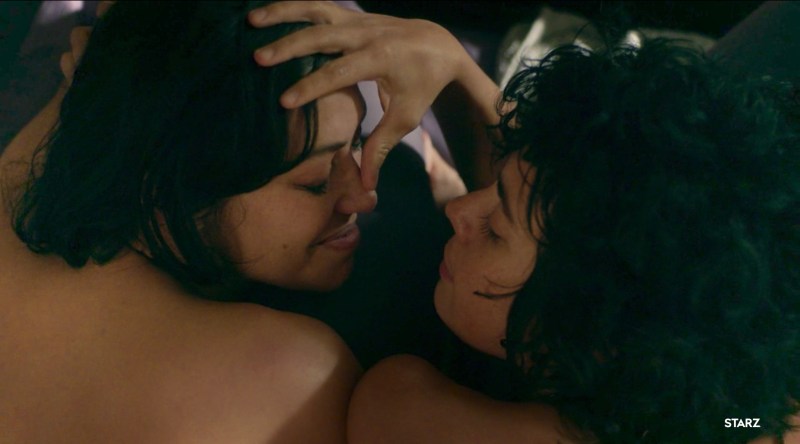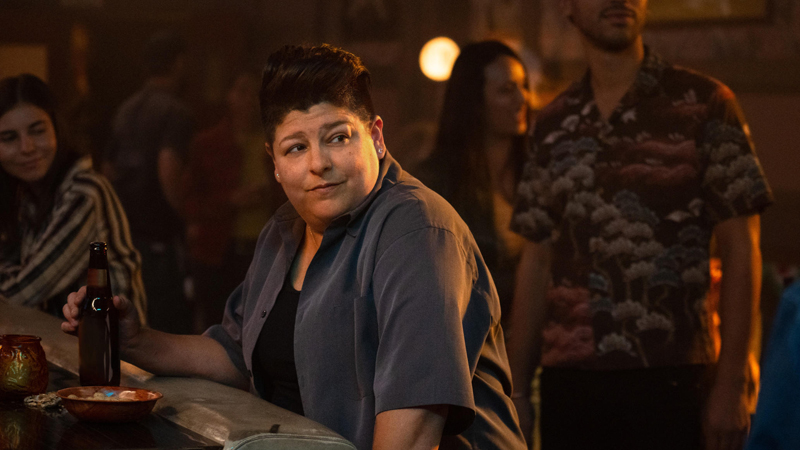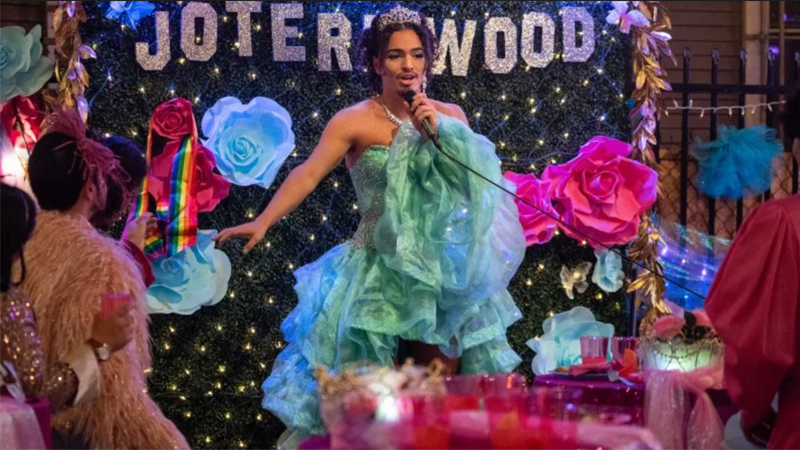Tanya Saracho, perhaps my favorite writer in all of television, started first and foremost as a playwright. Maybe it makes sense then that, even if out of her control, Vida is leaving us in its third act. Starz gave Saracho fewer episodes to work with (we’re back down to six, after Season Two’s expanded ten), and a smaller budget to boot, but in a mythologizing moment, Saracho marched into her writers’ room and wrote on the whiteboard: “Six Masterpieces.”
Much like the Hernandez sisters, Vida is her bar, her nightclub — and no one gets to push her out before last call without a fight.
So, how are the Hernandezes for their final spin on the beer-slicked and sticky dance floor? Season Three picks up roughly two days after Season’s Two explosive finale, when Lyn (Melissa Barrera) was smothered in detergent on Vida’s steps by neighborhood anti-gentrification activists making a point that she’s a vendida — a sell out — and Emma (Mishel Prada) made the brave choice to let down her guard with Nico (Roberta Colindrez), the handsome heartthrob bartender with one too many secrets and puppy dog eyes. Right away, what’s most shocking is that compared to the previous two years, which involved mourning a death and the aftermath of a violent hate crime, respectively, the opening of Vida’s third season feels positively light. This isn’t necessarily a stark break in tone, Vida will continue to explore what it’s always done best — intimacy, grief, family, shame. However, there’s a brightness that feels both earned and welcome.

No where is that better felt than with Emma. In this season’s opener, Emma and Nico left me butterflying in my stomach. I never thought we’d get to see a version of Emma that’s this soft, this vulnerable. The incomparable ice queen contemplating what it might look like to thaw. After three long years of waiting and wading through the pain with her, watching as her red lined lips screw up into an self-protective armor, these quiet moments are that much more delicate and sweet. Season Three opens with Chavela Vargas’ once-in-a-lifetime Latinx and Latin American lesbian anthem,”Macorina.” Vargas croons “ponme la mano aquí,” put your hand here, as Nico uses her fingertips to outline where Emma’s underwear meets her hips. They are bathed in sunlight and Nico’s nipple ring glimmers while Emma’s legs twitch instinctively.
This isn’t the first time we’ve seen Emma soften with a lover, her previous girlfriend Cruz comes immediately to mind, but we’ve most often seen her fuck for power. This year is different. Season Three asks that Emma finally learn how to trust. It’s not hard for us to squint and see here an Emma from another timeline, one where she wasn’t marked by abandonment or even sent away as a child for being queer in the first place. In another series, this development might feel cheap or rushed — but thanks to the care Saracho has taken all along, instead it delights.
Lyn is also busy finding surer footing for herself, using her creativity to turn Vida’s into a profitable success, but also finding new paths for herself that for once don’t involve her falling victim to her her own imposter syndrome. Some of that soul searching takes the character down a plot line that I cared less for (though to be fair, Lyn’s never been my favorite to begin with), still it’s good to see what the former consummate screw up looks like with her most irresponsible days behind her.

It’s within this newfound stability that Eddy (Ser Anzoategui) woefully brings the news that before she died, Vida kept another family secret from her daughters. The realization quite literally spins Emma and Lyn out of orbit (did I mention how cinematic the last season feels? Especially considering its tightened budget). In picking up the pieces of yet another Vida-casualty, the sisters are viciously torn in different directions, thematically returning the show all the way back to the original mystery of exactly why Emma was sent to live with their abuela, and the aftermath threatens to implode their already fragile bond. It’s heartbreaking, but also smartly re-centers Vida onto Lyn and Emma’s relationship as the nucleus of its final bow.
Watching the Hernandez women be potentially shaken asunder reminds us that the larger the personal growth, the greater the threat for setbacks. Tanya Saracho, who also directs the final three episodes of the series, including it’s nearly hour-long finale, has never been interested in telling a story that’s linear or pretty. She doesn’t find purpose in narratives that can be tied up into neat pink bows. It’s a bittersweet final lesson, that growing up is never really over and being committed to becoming a better version of yourself requires unrelenting grit, but I’d expect nothing less from Vida. When Emma and Lyn first came back to Boyle Heights for their Mamí’s funeral, they never planned on staying around. They certainly didn’t expect to shed the skin of the women they once were to become women they’d never met. Who plans on having a painful, electric, exhausting coming-of-age story well after you’ve grown?
Which isn’t to say that Vida’s final season isn’t also joyful. We don’t talk enough about the joy pocketed within grief. The respites that remind us that life is worth it, growth is worth it, and sometimes yes — even saying goodbye can be worth it. In their own ways, Lyn, Emma, and Eddy each spent the last three years saying goodbye to Vidalia and now we find ourselves saying goodbye to them. Our one last ride together comes packed with queer fuckery, including drag kings dressed as Chicanx macho icons (Danny Trejo’s Machete, El Mariachi, and Erik Estrada from CHiPs among them) and a “queer-ceañera” thrown for Marcos (Tonatiuh) that’s right out of my dream book. This line’s also featured in the trailer, but its so great I’d be amiss not to include it: while closing a prayer, Marcus calls the names of “Oshun, de la Guadalupana, de Santa Selena and Jenny from the Block, Amen” — a dedication that brings together Afro-Latinx religion, Mexico’s most beloved saint, and sacred millennial pop culture icons like only Vida can. Vida ends as it truly began, as a nuanced and detailed love letter to queer Chicanx and Latinx communities first and foremost.

Vida’s able to pull that off not only because of Saracho’s famously Latinx and queer writers’ room, or its slate of POC directors, but because throughout the series, not once is “identity” ever painted with a broad brush. That distinction has never been drawn more sharply than in Vida’s final season. Being Mexican-American or Chicanx doesn’t mean the same thing to Lyn — who is constantly being called “whitina” or “Coconut Barbie” on her way to work by Chicanx protestors from her own neighborhood only to be turned around told she’s not properly “Mexican enough” by her boyfriend’s wealthy Mexican family who looks down on her for speaking weak Spanglish and coming from a working class single mom — than it does for Mari’s best friend Yoli (Elizabeth De Razzo), who protests outside of the bar while being a DACA recipient, or Eddy, who grew up in Boyle Heights and never left. Similarly, queerness is embodied differently for Emma and Nico and Marcos and Eddy. There’s high femme lipstick and heels, there’s binders, there’s a dress with a full goatee — jotería in all its finest colors. Vida succeeds where others fail not just because the characters are richly developed, and not just because its masterfully written, but because it is both — all the time. There is no better place to say “Thank You” than right now, while we are all still here together.
Tanya Saracho instructed her team to write a final “six masterpieces” and ultimately, it feels almost petty to nitpick if they actually got there. I wish we had spent more time with Eddy and Mari this year. Though Set Anzoategui and Chelsea Rendon each get definite moments to shine, their characters seem to have gotten shorted for the two sisters in a rush for time. Some of the storylines were a little more on-the-nose than I’ve come to expect from a show that thrives in complications. But when placed against the magnificent history of these characters that Tanya Saracho’s built for us — journeys that were hard, and sexy, and so, so beautiful — everything else feels small.
Few get to say that they’ve truly made history. That what they’ve touched won’t be the same after they’ve gone. Television won’t be the same after Vida. That’s just a fact.



This show is such a great show. All I want from it is more.
I cannot to watch. I don’t think any other show has been so bitter and sweet. Emma is so relatable, but then her internalized homophobia hurts so much.
Thank you, Carmen. This show is close to my heart. Sad for it to end.
Thank you Carmen!!! Cannnnnnot wait to watch this!
I just watched the last episode and: six masterpieces is right.
Thanks for this review! I just finished it last night, the finale was near flawless. I’m so sad it’s over and that so many won’t get to see it because it’s on one of the more elusive platforms (though I did get the trial just for this).
I don’t want to get spoilery because I know a lot of folks haven’t seen it yet, but I so want to have conversations about Eddy’s whole amazing final episode and everything discussed!
Thank you Autostraddle for having brought to me yet another wonderful series I would never have discovered without you!
And thank you Carmen for the recaps.
I don’t know what took me so long to finally watch Vida, but I am so blown away. Thanks, Carmen (only 2-4 years later!) for these evocative write-ups; it’s such a pleasure to be in the virtual company of others who value the specificity, sharpness, and complexity of these characters and the stories. (Runner-up thanks to Drew for always referencing the great sex scenes on To L and Back Gen Q, again, not sure what took me so long to get here).
One thing I’ve been thinking about since finishing season 3 this week are the ways in which some of the shifts in characterization are, perhaps, partly a result of the writers showing us (to a certain extent) the world through the eyes of Emma and Lyn. I’m thinking in particular of Nico (who I adore; and to a lesser extent Cruz), and the ways in which the Nico we see see in season 2 is sort of a slightly idealized version, the version that Emma is drawn to/falling for, and it’s in the third season that her weaknesses, idiosyncracies, mistakes, flaws become more visible.
Initially I wondered if it was an L Word issue of characters having personality overhauls between seasons, but given the subtlety of the changes and the care and specificity of the writing, I think there’s something else going on — and it goes back to Emma and Lyn having the gravitational pull of the show’s stories. Think Lyn is wrong, Nico’s not a fuckboy, but I also love how the writers (and actors) hold space for her (and Emma, and Mari, and most of the other characters) to mess up, to be messy and complicated and even complicit.
I can’t believe how great this show was in only 22 short episodes. RIP Vida, you’ll live on in my heart and in another form (hopefully) via Lupe in ALOTO season 2.
I just watched the three seasons of this show.
S1 was fantastic.
S2 was a bit lesser, largely because of Nico, who was just too much of a Mary Sue on a show in which complex characters were its calling card.
S3 was just okay. The writers clearly heard feedback about Nico being a Mary Sue and course-corrected to turn her into an actual person, so that was an improvement. But the show was kind of all over the place. When I watched the series finale, I actually wasn’t 100% sure the writers knew this was the final season and the series finale (but I guess from this article, they did know) because of how all over the place storylines and characters were.
One thing that really bothered me is that Emma knew that Vida wanted Eddy to have part of the building and bar. I got the impression from Lyn that she would have been perfectly fine honoring Vida’s will instead of getting it overturned on a legality. Emma never, ever got called out for stealing Eddy’s part of the inheritance from her – legally, she didn’t, but morally, she totally did. She knew what Vida wanted and chose not to honor it. It kind of made me sad to see Eddy return and just become Emma’s employee – the last thing we ever actually see Emma say to Eddy is an order, “Would you mind the bar.”
I was surprised at how, given the way LGBT people have often been screwed over by their partners’ families, the writers thought it was okay to have Emma given a complete pass by all of the characters for screwing Eddy over. She wasn’t even going to return Eddy’s own car! Lyn finally returned it to her! Yeesh.